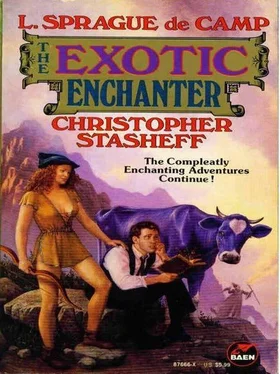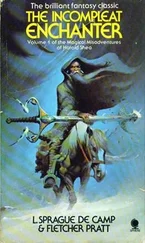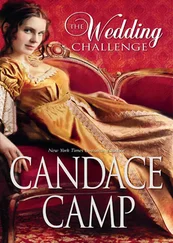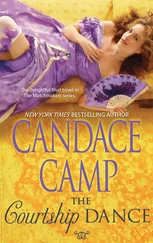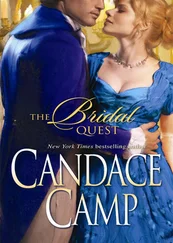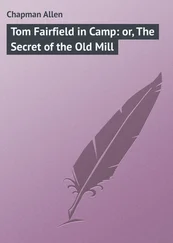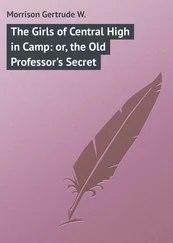L. Camp - The Exotic Enchanter
Здесь есть возможность читать онлайн «L. Camp - The Exotic Enchanter» весь текст электронной книги совершенно бесплатно (целиком полную версию без сокращений). В некоторых случаях можно слушать аудио, скачать через торрент в формате fb2 и присутствует краткое содержание. Жанр: Книги. Описание произведения, (предисловие) а так же отзывы посетителей доступны на портале библиотеки ЛибКат.
- Название:The Exotic Enchanter
- Автор:
- Жанр:
- Год:неизвестен
- ISBN:нет данных
- Рейтинг книги:4 / 5. Голосов: 1
-
Избранное:Добавить в избранное
- Отзывы:
-
Ваша оценка:
- 80
- 1
- 2
- 3
- 4
- 5
The Exotic Enchanter: краткое содержание, описание и аннотация
Предлагаем к чтению аннотацию, описание, краткое содержание или предисловие (зависит от того, что написал сам автор книги «The Exotic Enchanter»). Если вы не нашли необходимую информацию о книге — напишите в комментариях, мы постараемся отыскать её.
The Exotic Enchanter — читать онлайн бесплатно полную книгу (весь текст) целиком
Ниже представлен текст книги, разбитый по страницам. Система сохранения места последней прочитанной страницы, позволяет с удобством читать онлайн бесплатно книгу «The Exotic Enchanter», без необходимости каждый раз заново искать на чём Вы остановились. Поставьте закладку, и сможете в любой момент перейти на страницу, на которой закончили чтение.
Интервал:
Закладка:
Chalmers yelped, but the cold water had shocked a memory into Shea’s conscious mind.
“Doc,” Shea said, “I think I know where we are.”
Chalmers looked out inquiringly from the coarse linen towel with which he was drying himself, as Shea reached into the pile of trousers, shirts, coats, and low boots the servant had brought.
“Remember that cocktail party for the new faculty last fall?”
Chalmers nodded. A wealthy alumnus who had never outgrown an adolescent passion for Tolstoy had recently endowed a chair of Russian literature. The new incumbent was an emigre who said he had taught at the Imperial Academy of St. Petersburg. It might even have been true, and he was certainly the lion of the party.
Everyone was following the elephantine choreography prescribed for such occasions when Professor Zerensky’s path intersected that of Vaclav Polacek, the bad boy of the Garaden Institute. Polite introductions had degenerated into a katzenjammer conducted in Russian, and at one point Polacek started to take off his jacket. Shea elbowed him out of danger, and after threatening to allow him nothing but water until he cooled off, asked what the fuss was all about.
“That (Slavic epithet) had the gall to say that Borodin was a better composer than Smetanal” (More Slavic that Shea didn’t really want to have translated.)
Shea had learned, from occasional dealings with colleagues at Notre Dame, never to argue with nationalist fanatics. He suggested that the Rubber Czech solace himself by sticking to Pilsner and boycotting the vodka.
“I will!” Polacek said, and stuck to it.
“It’s too bad Polacek isn’t here,” Shea concluded. “This cold water would be just the thing for him.”
“I do not consider the theoretical virtues of the cold bath to be demonstrated in practice,” Chalmers replied. “As Florimel is not here, the impulse it is supposed to quench does not arise. If she were, there would be even less need for one.”
“Ah, right, Doc. But this Borodin character Professor Zerensky insulted Votsy with at that party — well, his last work was an opera called Prince Igor . He died before he finished it.”
“You mean we’re in an opera?” Chalmers cried, in the tone of someone who expects the overture to Tristan und Isolde to begin any second — and who can’t escape. “And its incomplete? Ah — are we expected to finish it?”
“I hope not,” Shea said, with a shudder. “Anyway, someone else did, after his death. But it was based on legends of early Russian heroes, so we’re probably in those.”
“how early?” Chalmers asked.
“I dunno. A long time before Peter the Great made the Russians shave their beards, anyway.”
“Peter the Great accomplished a great deal more than that, my boy. He founded the Russian navy, reorganized the military and civil administrations, and established the Imperial capital of St. Petersburg.”
“Well, it’s neither Imperial, the capital, nor St. Petersburg anymore.”
The footcloths provided with the boots were puzzling to men accustomed to socks.
“Uh, Doc,” Shea said, struggling with his, “about Florimel. Do you think she’s . . . here?” Their departure from the world of the Aeniad had been made in haste and disorder, thanks to a vengeful god.
Chalmers’ face was almost as stern as Igor’s — his version of the stiff upper lip. “If she isn’t . . .” was all he said.
Shea laced up his second boot, then rose and clapped Chalmers on the shoulder. “Let’s start looking. If nothing else, we can join up with one of those merchants Igor mentioned. Meanwhile, we’ve eaten his bread and salt, so let’s see what else he has to offer.
“Ready, Doc?’
“Quite, my boy,” Chalmers replied, steadily enough.
* * *
The servant led them back to the main building. Shea recognized the big, beehive-shaped stove in the corner; according to National Geographic , it was still used in the Russia of his own day. The benches and tables were of finely planed wood, and there was an icon on the east wall.
The building was well chinked and had only one window. Though warm, by Harold Shea’s standards it wanted a good airing.
Dinner was smoked venison, more of the coarse bread, and plenty of mead, kvass, and weak ale. The cups and bowls were finely finished wood, and steel knives were provided. Shea had tasted worse mead, but this was much too sweet for his taste so he only sipped.
While they were eating, the huntsmen trailed in, by way of the bathhouse. Each bowed to the icon and the prince before sitting down. Two joined the psychologists at Igor’s table; they were introduced as Oleg Nikolaivich and Mikhail Sergeivich.
Apparently it was considered bad manners to speak with one’s mouth full, but worse manners to have an empty cup. The room became loud with the sounds of cheerful drunkenness, the scurrying feet of servants and the stumbling ones of men seeking the privy.
Igor, and Mikhail, and Oleg after they sat down, watched the two visitors closely. As Shea and Chalmers did nothing more alarming than eat, the atmosphere at the table soon relaxed.
After the edge was off, Igor asked a number of shrewd questions about their origins. Shea left the answers to Chalmers, who said quite honestly that they were adventurers who had seen many a strange land.
“Indeed, Your Highness, we have seen the hippogriff, ridden a flying carpet, and drunk the wine of the gods! May I tell you about — ?”
“Another cup, and you will have battled sorcerers and tamed werewolves,” Igor interrupted. “Doubtless you also saw the firebird, and the Yaga in her hut, while you were in the forest. But tell me — by what road did you enter the lands of the Rus? Did you come from Galich, or by way of Polotsk?”
“Ah, we came the long way round, Your Highness. We were trying to avoid trouble.”
“Wise of you. But this is not trouble; you have yet to meet that. Now, to get to the forest, you must have passed Velikaya Klyucheva. How fared the harvest there?”
“Really, I am not a farmer, Your Highness. I could see nothing wrong.”
“Well, then, have you seen any burned or abandoned villages?”
“No, Your Highness.”
“Any men mounted on small, shaggy ponies, riding without stirrups and often without saddles? They would be wearing ragged coats and trousers, caps and boots. and many layers of filth. Their weapons would be long knives and curved bows.”
“They sound like folk one would not care to meet. Bandits?”
“Polovtsi. You saw none?”
“No, Your Highness.”
“Did you even pass by any of their campsites? They are hard to overlook, for one can smell them three days’ ride downwind.”
“I am sure we passed nothing of the kind, Your Highness.”
“Hippogriffs and flying carpets you have seen, but not the scourge of the steppes! And you call yourselves scholars! You did not need to come so far just to learn new tales to spin for your supper! So perhaps —”
At this point, to the psychologists relief, someone struck up a gusla , an instrument that looked like a near ancestor of the balalaika. Then he started a song that had everyone lifting their cups.
As more of the men joined in the newcomers were able to hear that it was a listing of heroes; at every name a cup was drained. Igor and the rest drank to Sviatoslav of Kiev, Yaroslav the Wise, Mstislav the Brave, another Sviatoslav of Kiev, Vsevolod of Suzdal, and Yaroslav of Galich. But when a certain Oleg was named, Igor looked morose, and his cup lost its rhythm. Nor did he drink again, and the song faltered as others followed the prince. The player ended with a roaring paen to Vladimir the Great, then called for the singers due. No few cups were set before him.
Читать дальшеИнтервал:
Закладка:
Похожие книги на «The Exotic Enchanter»
Представляем Вашему вниманию похожие книги на «The Exotic Enchanter» списком для выбора. Мы отобрали схожую по названию и смыслу литературу в надежде предоставить читателям больше вариантов отыскать новые, интересные, ещё непрочитанные произведения.
Обсуждение, отзывы о книге «The Exotic Enchanter» и просто собственные мнения читателей. Оставьте ваши комментарии, напишите, что Вы думаете о произведении, его смысле или главных героях. Укажите что конкретно понравилось, а что нет, и почему Вы так считаете.
